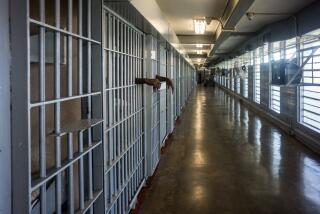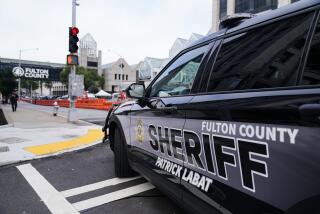Court Says Whites Can Cite Racial Bias in Jury Makeup
- Share via
WASHINGTON — A white Louisiana man can try to have his murder conviction thrown out by claiming racial discrimination against black people in the makeup of the grand jury that indicted him, the Supreme Court said Tuesday.
Even though murder defendant Terry Campbell is white, he still can raise his claim that blacks were unlawfully prevented from serving as grand jury foremen, the court said. The unanimous ruling lets Campbell challenge the charges filed by the grand jury.
Campbell, “like any other white defendant, has standing to raise an equal-protection challenge to discrimination against black persons in the selection of his grand jury,” Justice Anthony M. Kennedy wrote for the court.
“Regardless of his or her skin color, the accused suffers a significant injury in fact when the composition of the grand jury is tainted by racial discrimination,” he said.
Although it already was clear that black defendants could raise a challenge that blacks were unfairly excluded from a grand jury, it was not certain whether white defendants could assert the same claim, said Campbell’s lawyer, Dmitrc Burns.
Louisiana Atty. Gen. Richard Ieyoub said that for Campbell to win reversal of his conviction, “he will have to offer proof that there was in fact discrimination in the selection of this grand jury.” Ieyoub added that three members of the grand jury that indicted Campbell were black.
In Louisiana, grand jury foremen are chosen by the judge, separate from the random selection of the other 11 grand jurors, and therefore the choice of foreman affects the makeup of the panel.
Ohio, Oklahoma, Tennessee and Virginia use similar procedures.
Campbell was convicted of murder in the January 1992 shooting death of James L. Sharp and sentenced to life without parole. He challenged his indictment, saying blacks were systematically kept from serving as grand jury foremen in Evangeline Parish.
The Louisiana Supreme Court upheld Campbell’s murder conviction, saying that because he was white, he had no legal standing to challenge the exclusion of blacks as grand jury foremen.
Kennedy wrote that the Louisiana court was wrong because the selection of a foreman in that state affected the grand jury’s makeup.
His opinion was joined in full by Chief Justice William H. Rehnquist and Justices John Paul Stevens, Sandra Day O’Connor, David H. Souter, Ruth Bader Ginsburg and Stephen G. Breyer.
Justices Clarence Thomas and Antonin Scalia dissented from the part of the court’s ruling that said white defendants could assert the right of blacks to be free from bias in choosing grand juries.
“I fail to understand how the rights of blacks excluded from jury service can be vindicated by letting a white murderer go free,” Thomas wrote for the two. But he and Scalia agreed Campbell could challenge the indictment on grounds his due-process rights were violated.
In other action, Thomas refused to block Whitewater witness David Hale’s trial in an Arkansas state court on charges of lying to insurance regulators. Hale contended that a plea agreement and immunity granted by federal Whitewater investigators should protect him against prosecution in the state case.
More to Read
Sign up for Essential California
The most important California stories and recommendations in your inbox every morning.
You may occasionally receive promotional content from the Los Angeles Times.













